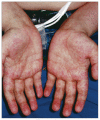HDAC inhibition and graft versus host disease - PubMed (original) (raw)
Review
HDAC inhibition and graft versus host disease
Sung Choi et al. Mol Med. 2011 May-Jun.
Abstract
Histone deacetylase (HDAC) inhibitors are currently used clinically as anticancer drugs. Recent data have demonstrated that some of these drugs have potent antiinflammatory or immunomodulatory effects at noncytotoxic doses. The immunomodulatory effects have shown potential for therapeutic benefit after allogeneic bone marrow transplantation in several experimental models of graft versus host disease (GVHD). These effects, at least in part, result from the ability of HDAC inhibitors (HDACi) to suppress the function of host antigen presenting cells such as dendritic cells (DC). HDACi reduce the dendritic cell (DC) responses, in part, by enhancing the expression of indoleamine 2,3-dioxygenase (IDO) in a signal transducer and activator of transcription-3 (STAT-3) dependent manner. They also alter the function of other immune cells such as T regulatory cells and natural killer (NK) cells, which also play important roles in the biology of GVHD. Based on these observations, a clinical trial has been launched to evaluate the impact of HDAC inhibitors on clinical GVHD. The experimental, mechanistic studies along with the brief preliminary observations from the ongoing clinical trial are discussed in this review.
Figures
Figure 1
Acute GVHD of the skin. Photograph courtesy U of Michigan, BMT program.
Figure 2
Pathophysiology of GVHD. Three phases of GVHD pathophysiology. From: Reddy P, Ferrara JLM. (2009 Feb 28) Mouse models of graft-versus-host disease. In: StemBook [Internet]. Cambridge (MA): Harvard Stem Cell Institute; 2008–. Available at:
http://www.stembook.org/node/548
Figure 3
The regulation of immune cells by histone deacetylase inhibitors (HDACi). HDACi have direct and indirect effects on various immune cellular subsets: HDACi play an important role in the negative regulation of APCs, reduce the secretion of inflammatory cytokines, increase the numbers and function of naturally occurring regulatory T cells (Tregs), and activate natural killer (NK) cell–mediated activity.
Figure 4
The regulation of DCs by histone deacetylase inhibitors (HDACi).
Similar articles
- Targeting deacetylases to improve outcomes after allogeneic bone marrow transplantation.
Reddy P. Reddy P. Trans Am Clin Climatol Assoc. 2013;124:152-62. Trans Am Clin Climatol Assoc. 2013. PMID: 23874019 Free PMC article. - Histone deacetylase inhibition modulates indoleamine 2,3-dioxygenase-dependent DC functions and regulates experimental graft-versus-host disease in mice.
Reddy P, Sun Y, Toubai T, Duran-Struuck R, Clouthier SG, Weisiger E, Maeda Y, Tawara I, Krijanovski O, Gatza E, Liu C, Malter C, Mascagni P, Dinarello CA, Ferrara JL. Reddy P, et al. J Clin Invest. 2008 Jul;118(7):2562-73. doi: 10.1172/JCI34712. J Clin Invest. 2008. PMID: 18568076 Free PMC article. - Histone deacetylase inhibition regulates inflammation and enhances Tregs after allogeneic hematopoietic cell transplantation in humans.
Choi SW, Gatza E, Hou G, Sun Y, Whitfield J, Song Y, Oravecz-Wilson K, Tawara I, Dinarello CA, Reddy P. Choi SW, et al. Blood. 2015 Jan 29;125(5):815-9. doi: 10.1182/blood-2014-10-605238. Epub 2014 Nov 26. Blood. 2015. PMID: 25428224 Free PMC article. Clinical Trial. - Targeting Histone Deacetylases to Modulate Graft-Versus-Host Disease and Graft-Versus-Leukemia.
Kim S, Santhanam S, Lim S, Choi J. Kim S, et al. Int J Mol Sci. 2020 Jun 16;21(12):4281. doi: 10.3390/ijms21124281. Int J Mol Sci. 2020. PMID: 32560120 Free PMC article. Review. - Modulation of immune responses by histone deacetylase inhibitors.
Schotterl S, Brennenstuhl H, Naumann U. Schotterl S, et al. Crit Rev Oncog. 2015;20(1-2):139-54. doi: 10.1615/critrevoncog.2014012393. Crit Rev Oncog. 2015. PMID: 25746108 Review.
Cited by
- The Influence of the Preservation Method and Gamma Irradiation Sterilization on TGF-β and bFGF Levels in Freeze-Dried Amnion Membrane (FD-AM) and Amnion Sponge.
Suroto H, Aryawan DM, Prakoeswa CA. Suroto H, et al. Int J Biomater. 2021 Apr 7;2021:6685225. doi: 10.1155/2021/6685225. eCollection 2021. Int J Biomater. 2021. PMID: 33927767 Free PMC article. - Mitochondrial Deacetylase SIRT3 Plays an Important Role in Donor T Cell Responses after Experimental Allogeneic Hematopoietic Transplantation.
Toubai T, Tamaki H, Peltier DC, Rossi C, Oravecz-Wilson K, Liu C, Zajac C, Wu J, Sun Y, Fujiwara H, Henig I, Kim S, Lombard DB, Reddy P. Toubai T, et al. J Immunol. 2018 Dec 1;201(11):3443-3455. doi: 10.4049/jimmunol.1800148. Epub 2018 Nov 2. J Immunol. 2018. PMID: 30389773 Free PMC article. - Immunoepigenetics Combination Therapies: An Overview of the Role of HDACs in Cancer Immunotherapy.
Banik D, Moufarrij S, Villagra A. Banik D, et al. Int J Mol Sci. 2019 May 7;20(9):2241. doi: 10.3390/ijms20092241. Int J Mol Sci. 2019. PMID: 31067680 Free PMC article. Review. - Immunosuppressive capacity of mesenchymal stem cells correlates with metabolic activity and can be enhanced by valproic acid.
Killer MC, Nold P, Henkenius K, Fritz L, Riedlinger T, Barckhausen C, Frech M, Hackstein H, Neubauer A, Brendel C. Killer MC, et al. Stem Cell Res Ther. 2017 Apr 26;8(1):100. doi: 10.1186/s13287-017-0553-y. Stem Cell Res Ther. 2017. PMID: 28446224 Free PMC article. - Pharmacologic prophylaxis regimens for acute graft-versus-host disease: past, present and future.
Ram R, Storb R. Ram R, et al. Leuk Lymphoma. 2013 Aug;54(8):1591-601. doi: 10.3109/10428194.2012.762978. Epub 2013 Jan 24. Leuk Lymphoma. 2013. PMID: 23278640 Free PMC article. Review.
References
- Appelbaum FR. Haematopoietic cell transplantation as immunotherapy. Nature. 2001;411:385–9. - PubMed
- Welniak LA, Blazar BR, Murphy WJ. Immunobiology of allogeneic hematopoietic stem cell transplantation. Annu Rev Immunol. 2007;25:139–70. - PubMed
- Nash RA, et al. Phase III study comparing methotrexate and tacrolimus with methotrexate and cyclosporine for prophylaxis of acute graft-versus-host disease after marrow transplantation from unrelated donors. Blood. 2000;96:2062–8. - PubMed
- Antin JH, Ferrara JL. Cytokine dysregulation and acute graft-versus-host disease. Blood. 1992;80:2964–8. - PubMed
Publication types
MeSH terms
Substances
Grants and funding
- CA143379/CA/NCI NIH HHS/United States
- AI075284/AI/NIAID NIH HHS/United States
- K23 AI091623/AI/NIAID NIH HHS/United States
- R01 AI075284/AI/NIAID NIH HHS/United States
- R01 CA143379/CA/NCI NIH HHS/United States
- R01 HL090775/HL/NHLBI NIH HHS/United States
- HL090775/HL/NHLBI NIH HHS/United States
LinkOut - more resources
Full Text Sources
Research Materials
Miscellaneous



